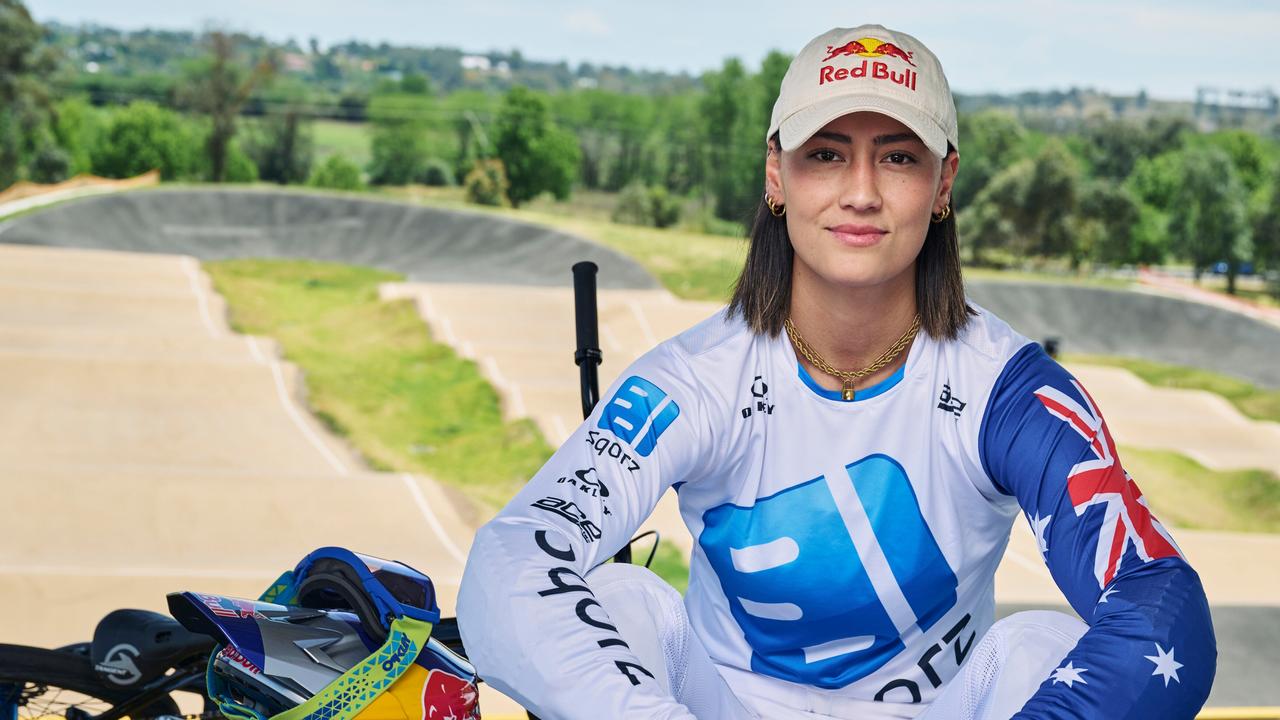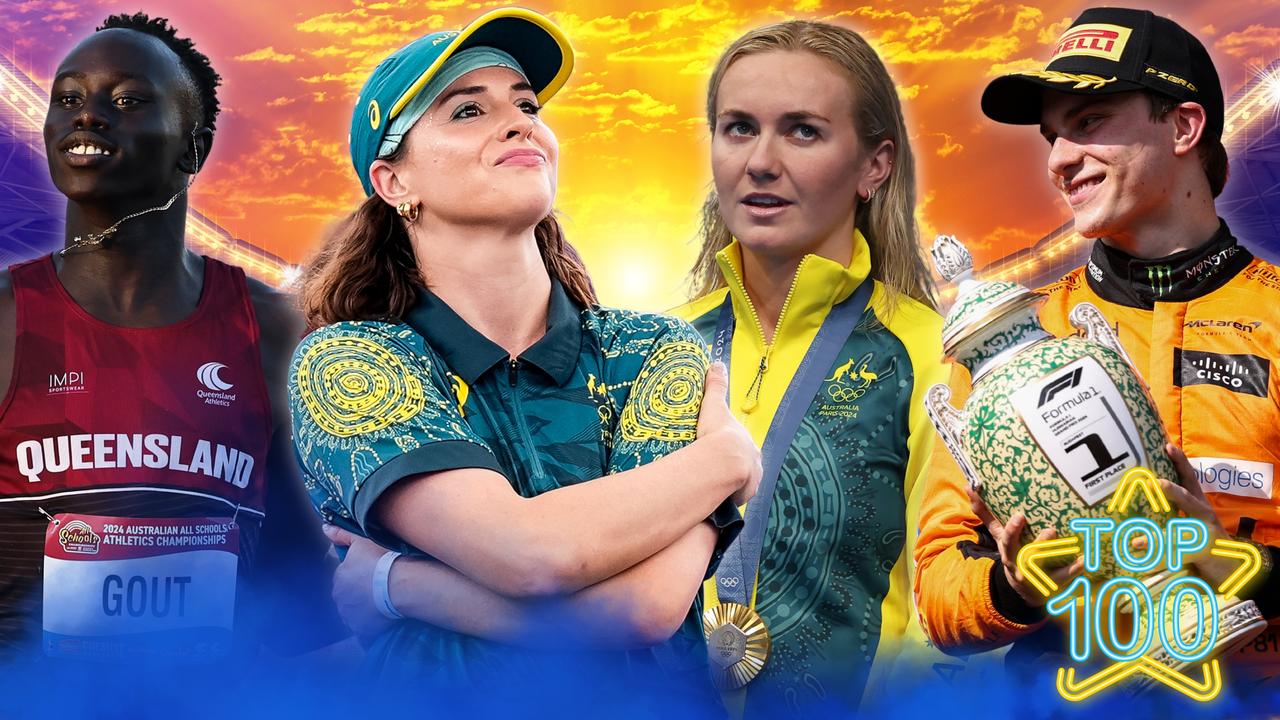Olympic greatness is more than gold medals, stats and podium visits, so who is the GOAT?
GOLD medals, number of medals and longevity all play a part in determining the GOAT, but who is the greatest Olympian ever? Here are the candidates. VOTE.
Aus Team News
Don't miss out on the headlines from Aus Team News. Followed categories will be added to My News.
TO BE the greatest Olympian of all time you need to be more than an Olympian.
It’s true that gold medals, number of medals and longevity all play a part but true greatness is more than numbers, stats and podium visits.
It’s about being a household name 50 years after you retire, maybe rising above considerable odds, leaving a legacy, reshaping your sport or going where no-one has been before.
As Richie Benaud used to say when picking his Greatest XI’s “statistics take the argument only so far — I always look for people who changed the game.’’
SCROLL DOWN TO VOTE FOR YOUR GOAT
People still remember that Nadia Comaneci was the gymnast who scored the perfect 10, that Muhammad Ali won an Olympic gold, that Carl Lewis won the long jump four times in a row and that Brit Steve Redgrave somehow rowed his way to five consecutive golds.
Lewis would have an imposing case to be rated the best of all time but he has admitted to secretly failing drug tests which were covered up before the Seoul Olympics.
That’s an immediate red cross through his name, for the best of all time must be without blemish.
While medal tallies matter, raw appeal, not just from your own country but the world, counts.
Fans celebrate the showmanship of Usain Bolt as much as they celebrate his six Olympic gold medals.
They luxuriate the fact that in a sport being riddled with drug cheats he continued to be the shining example that the clean and the fair can still win.
Bolt was an unforgettable champion but not all gold medallists have this status.
Bob Hayes, Armin Hay and Lindy Remigino all won the coveted Olympic 100m sprint title yet when was the last time you heard their name? Ever?
No-one will ever say that about Bolt or Ali or Comaneci.
SO WHO IS THE GREATEST OLYMPIAN?
Robert Craddock — NewsCorp Rio 2016 team
Jesse Owens — track and field, 100m, 200m, 4x100m relay, long-jump
Olympic medals — 4 gold
Michael Phelps won 18 Olympic gold medals. Jesse Owens just four. Yet, in my books, Owens rates above him as the greatest Olympian of all time because of when he got them, how he got them and what it meant to the outside world.
Owens travelled in third class by steam ship to Germany with other Afro-American athletes to the 1936 Berlin Games where Adolf Hitler had most of the German population convinced of Aryan superiority on the eve of World War II.
The German media even referred to Owens and some other African-American athletes as “black auxiliaries.”
Yet the magnificent Owens embarrassed Hitler by winning four track and field gold medals.
Despite facing further discrimination back home in the United States he became the inspiration for generations of Afro-American sportsmen who followed him.
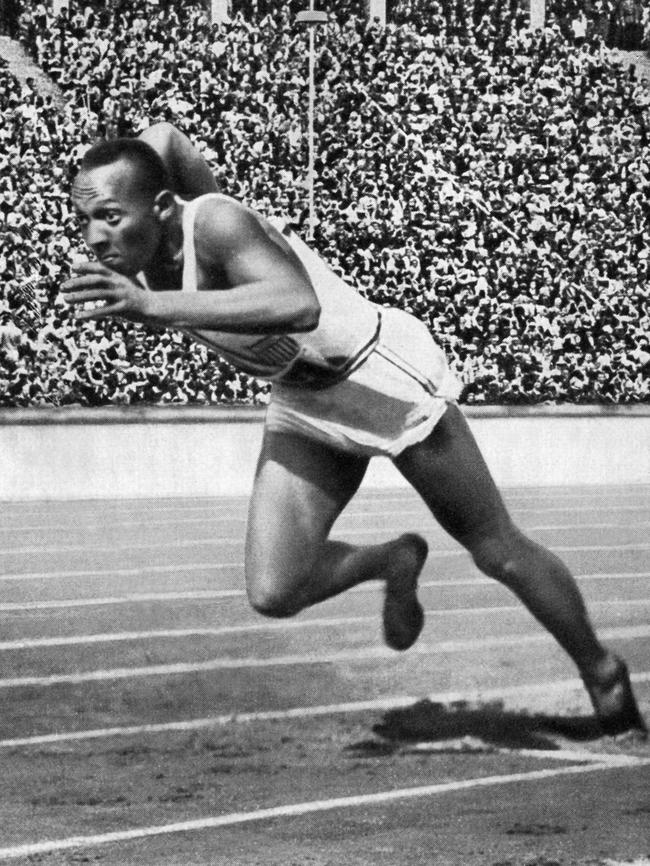
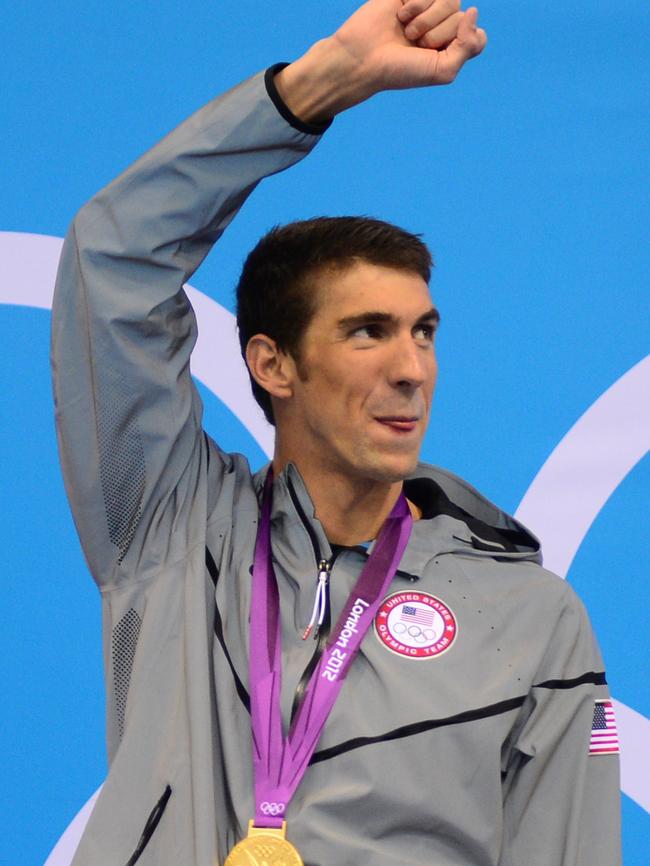
Bronte Campbell — Australia swimmer
Michael Phelps: 200m butterfly, 200m freestyle, 4x100m freestyle, 4x200m freestyle, 100m butterfly, 200m IM, 400m IM, 4x100IM, 4x100m MR
Olympic Medals: 22 (18 gold, 2 silver, 2 bronze)
As much as I would like to say an Australian, it’s got to be Michael Phelps. He’s the guy that’s won 22 medals - eight in one meet with numerous world records. No-one has gotten close to what’s he’s done. And in a modern era when it’s so competitive, and everyone is so specialised, it’s something I don’t think we’re going to see again. He is without a doubt the standout of the past few years.
Cameron McEvoy — Australian swimmer
Michael Phelps
Phelps, not only because of the highest medal tally but also the gruelling schedule he has to go to at each Games to get those medals. It’s unbelievable. I do maybe six fewer swims than him in a week and by the end of the week I want to relax for half a year. I can’t fathom what that would be like. The medal tally, I’m in such awe.
Cate Campbell — Australian swimmer
Michael Phelps
Sorry Australia but it’s Michael Phelps — I mean the guy has something like 18 Olympic gold medals — 18! I’m trying to get one. He has 22 medals or something like that. You can’t touch that and you know what, he’s still going so he’s probably going to win more!
Kim Mickle — Australia javelin
Jan Zelezny — Javelin
Olympic Medals: 3 gold
I’ve got to go with one of my own so Jan Železný, he’s won back-to-back-to-back which is exceptional and he’s a legend in our sport. If I had to pick a non-Aussie it would be him. If I pick a homegrown talent then — sticking with track and field again — Cathy Freeman takes the cake!
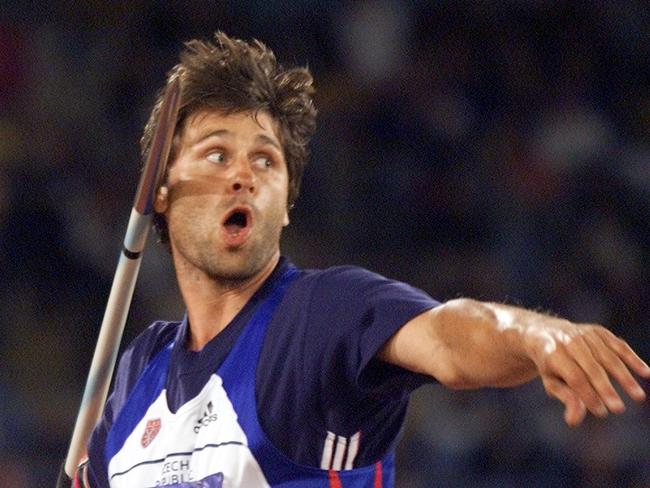
John Coates — AOC president
It’s very difficult these days when you compare different sports. You’ve got Phelps now and the ability to win 20 medals in a sport but we’ve had some other wonderful athletes. Do you look at one single performance like Herb Elliott’s? His time stood for years. You’ve got Nadia Comaneci and what she did and we’ve produced our fair share of them with Betty Cuthbert, Marjorie Jackson, Shirley Strickland and Ian Thorpe. We’re up there but it’s hard to separate them.
Kitty Chiller — former Australian Olympian and 2016 chef de mission
Daley Thompson - 2 decathlon Olympic gold
Debbie Flintoff-King - 1 gold 400m hurdles
My favourite Olympians are both track and field athletes. I remember Daley Thompson winning gold in the Decathlon at the 1980 Moscow Olympics. They were the first Games I really remember watching on television and Daley’s world record winning efforts in the 10 disciplines started my fascination with multi-event sports. He went on to defend that gold medal in Los Angeles in 1984 and ended up with four world records. A real all-rounder who for me embodies the ‘true Olympian’.
As far as Australian Olympians my favourite would be Debbie Flintoff-King, winner by the smallest of margins in the 400 hurdles in Seoul 1988. I was privileged to play a small part in Debbie’s preparations for those Games and her dedication, commitment and professionalism in her approach was second to none. I was on the finish line in the stadium in Seoul when she won — by just one one-hundredth of a second. As well as her supreme strength and speed, her courage to overcome illness and the sudden death of her sister just three days before she left for the Games makes her one of Australia’s greatest and one of my favourites.
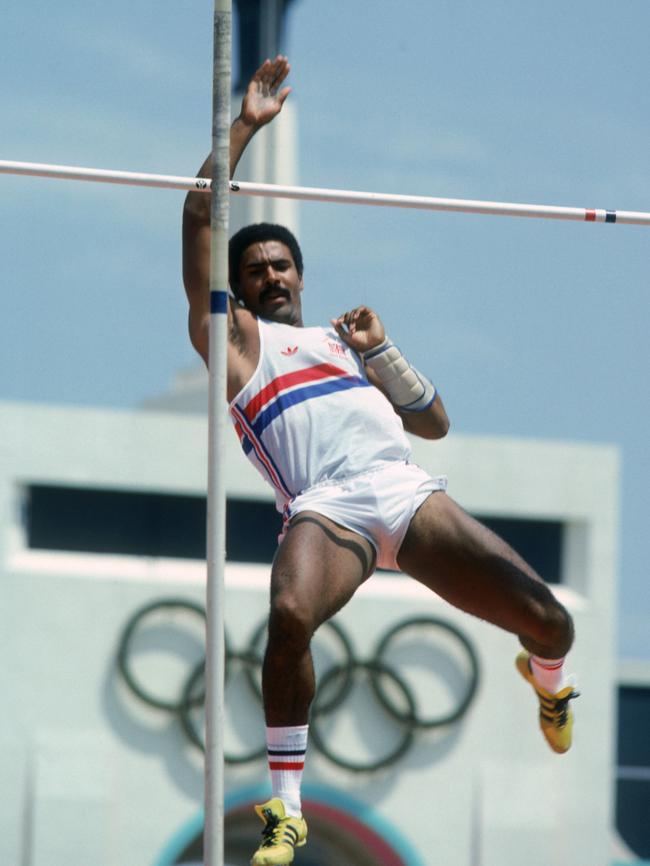
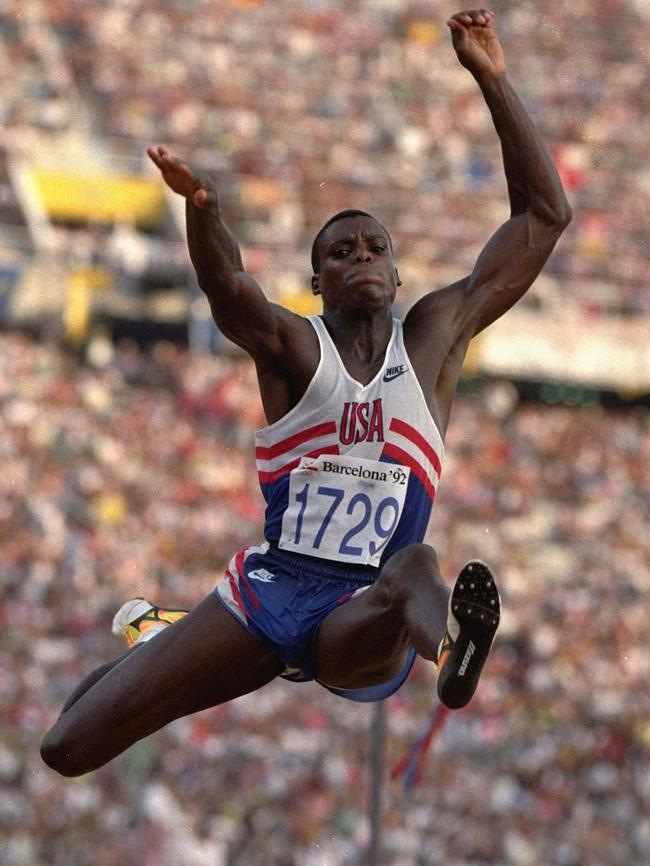
Josh Clarke — Australian sprinter
Carl Lewis — long-jump, 100m sprint, 200m, 4x100m
Olympic Medals: 9 gold, one silver
From a track point of view Carl Lewis based on what he achieved and how long his career spanned. That’s the politically correct answer but Maurice Greene was my idol growing up.
Jess Trengove — Australian marathon runner
Anna Meares 500m TT, sprint, team sprint & Cathy Freeman 400m
Meares Olympic medals: 2 gold, 2 silver, 1 bronze
Freeman Olympic medals: 1 gold, 1 silver
I would say Anna Meares is a good candidate for this. I mean there are so many great ones, I think Cathy Freeman also, she achieved something at a moment when I was so heavily influenced and aspiring to be an Olympian. What Cathy did in 2000 made me want it even more but what Anna did in 2012 was for me an athlete I’ve seen work so hard and I’ve followed her career. To see her pull it off was so special.
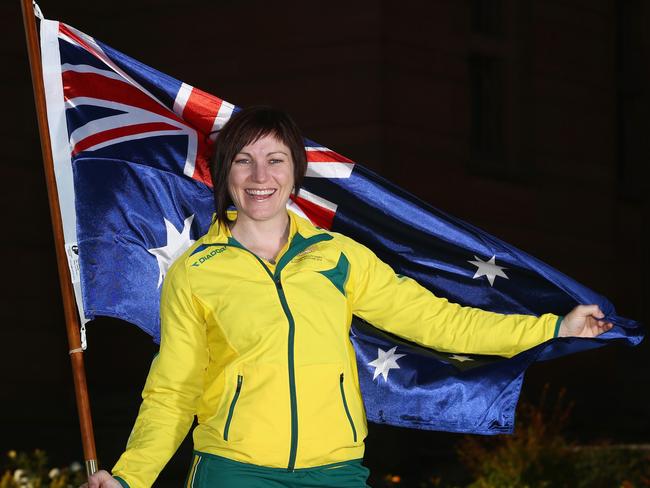
Josh Dunkley-Smith — Australian rower
Oarsome Foursome:
(Barcelona combination) Nick Green, Mike McKay, Andrew Cooper, James Tomkins
(Atlanta combination) Nick Green, Mike McKay, Drew Ginn, James Tomkins
(London combination) Drew Ginn, James Chapman, Joshua Dunkley-Smith, Williams Lockwood
Olympic medals: two gold, one silver
There are so many to choose from but the greatest crew would have to be the Oarsome Foursome. The guys in there, with their flair, represent the joy Australians take in their sport.
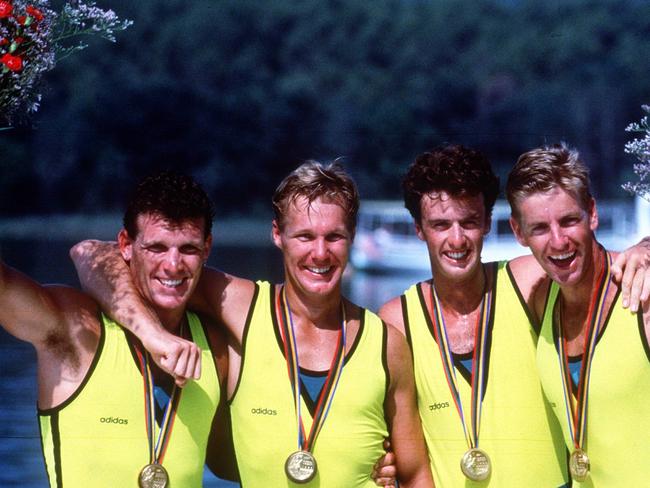
Georgia Nanscawen - Hockeyroos, 2012 Olympian.
Rechelle Hawkes
Olympic medals: 3 gold
All bias aside, the achievements of ex-Hockeyroo Rechelle Hawkes should put her amongst the greatest Olympians of all time. Competing at four Olympic Games (1988, 1992, 1996, 2000), Rechelle became the second Australian woman after Dawn Fraser to win three Olympic gold medals at three separate Olympic Games.
Captain of the Hockeyroos for eight years, she had the honour of reading the Athlete’s Olympic Oath at the Sydney 2000 Olympic Games and was inducted into the Sport Australia Hall of Fame in 2002. As a fellow hockey player, I have an immense appreciation of how incredible Rechelle’s achievements truly were.
Scott Gullan — NewsCorp Rio 2016 team
Usain Bolt — 100m, 200m, 4x100m relay
Olympic Medals: 6 gold
Why: If Usain Bolt packed up and went home after what he did at the Beijing Games in 2008 then he would still be in contention for this honour.
Three gold medals, all in world record time changed the face of athletics forever.
Being just a few rows from the finish line when the Jamaican superstar basically jogged across the line in the 100m to clock 9.69 sec is one of those moments that lives in the memory bank forever.
For Bolt to then do exactly the same thing four years later in London seals the deal as the greatest of all time.
David Riccio — NewsCorp Rio 2016 team
Michael Phelps
Think about the dedication. Think about the sacrifice. Think about how athletically-gifted a human-being must be to win just one Olympic medal, of any colour.
Now think about Phelps.
In a career spanning just three Olympic Games, Phelps won 18 gold medals - double the next best haul by any other Olympian.
I was at the Water Cube the night Phelps won his eighth gold medal at the 2008 Beijing Olympic Games.
It was the night he overtook fellow swimmer Mark Spitz for the most first-place finishes at a Games.
In the 4x100m relay final, Phelps went into the water trailing after 100m and 200m breastroke champion Kosuke Kitajima had handed Japan the lead at the halfway mark.
But Phelps, he mowed Kitajima down, as though the Japanese champion was tied to the lane rope.
Amazing. It was almost mechanical.
Evidence of him smoking marijuana back in 2009, was also proof the American wasn’t some kind of machine.
Phelps wasn’t a robot, he was human.
And he was also the best Olympian we have ever seen.
Jon Ralph — News Corp Rio 2016 team
Usain Bolt
It’s all about impact, not just the weight of glittering gold around your neck.
That makes it Usain Bolt, who alone has saved the 100m dash from drug-fuelled oblivion in the steroid era. Only six gold medals to Michael Phelps’ 18, but when did Phelps really, truly ever make your pulse race?
To be there live to see Bolt set alight the London Olympic stadium was up there with Cathy Freeman’s moment for me.
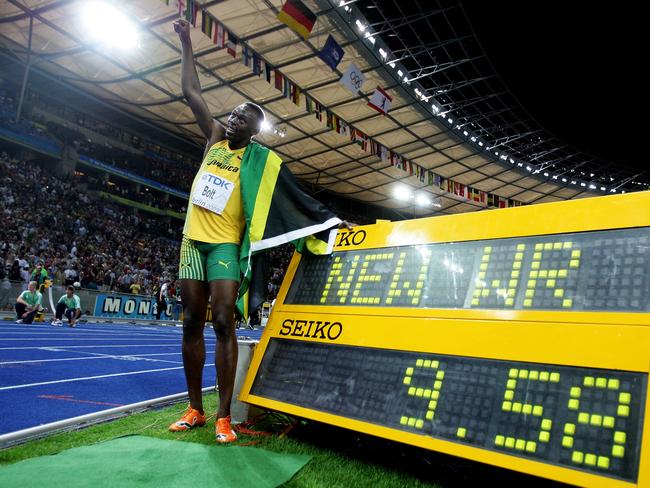
Reece Homfray — NewsCorp Rio 2016 team
Emil Zatopek: 5km, 10km, marathon
Olympic Medals: 4 Gold, 1 silver
Emil Zatopek remains the only runner in history to win the 5km, 10km AND marathon in the same Olympics — an incredible feat in Helsinki in 1952.
After winning the 5km and 10km he only entered the marathon at the last minute and won that as well. It was the first marathon he had ever raced and all three gold medals came in Olympic record time.
At his first Olympics in London in 1948 Zatopek also won gold in the 10km and silver in the 5km.
Quite simply the man was a beast, known for his relentless training regimes and was reportedly responsible for instigating interval and hypoventilation training (running while holding your breath).
In the lead up to the 1956 Olympics Zatopek was hospitalised with a groin injury but still managed to finish sixth in his marathon defence.
If all that wasn’t enough, the Czech runner famously gave one of his Olympic gold medals to Australian middle distance running great Ron Clarke in 1968 because he believed Clarke had deserved to win one during his own stellar career.
An absolute champion on and off the track.
Mike Colman — NewsCorp Rio 2016 team
Michael Phelps
Michael Phelps ticks all the boxes. He has won the most medals, the most gold medals and the most at any one Games, plus he has the element of longevity, having competed at three Olympics so far. The only category in which he is not in front is most individual medals, which is owned by Russian gymnast Larisa Latynina who between 1956 and 1964 won 14 individual medals to Phelps’s 11.
As well as that, Phelps has four minor medals (two silver, two bronze) in his 22 medal haul which isn’t as good a strike rate as his countryman, standing jumper Ray Ewry, who between 1900 and 1908 won eight gold medals in eight starts.
The great distance runner Paavo Nurmi also achieved something that Phelps didn’t, winning two races — the 1500m and 5000m — on the same afternoon. And then, of course, there was Hungarian fencer Aladar Gerevich who won the same event at six Olympics between 1932 and 1960, a period of 28 years.
Phelps, who won his first medal in 2004, probably won’t be still be competing at the 2032 Games, but he makes a good case for being crowned the greatest-ever Olympian nonetheless.
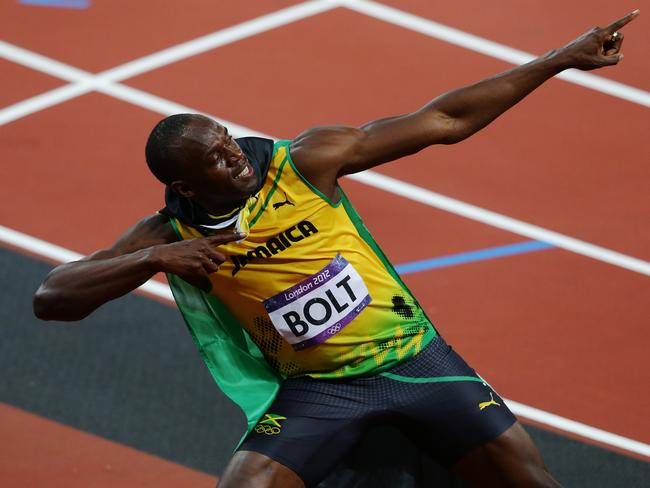
Todd Balym — NewsCorp Rio 2016 team
Usain Bolt
Nobody has carried the image and hopes of the Olympic movement more in recent times than sprinter Usain Bolt.
He is the face of hope in a sport plagued by doping controversies and the man everyone comes to see run on the track.
Comparing athletes across sports and eras is impossible, there is no fair way to do it.
A swimmer like Michael Phelps can win multiple medals by virtue of the fact he has more events in his discipline. He is without doubt the most successful Olympian of all time, but does that make him any better than a rower like Drew Ginn who has won medals, mostly gold, at four different Olympics spanning 16 years.
Can the greatest be someone that’s excelled well at one or two events as opposed to someone whose sport has enabled them to excel at several?
Why Bolt stands alone as the greatest in my opinion is because in an event available to every country and every athlete, let’s face it everyone can learn to run but not every country has a pool, tennis court or velodrome, he is unbeatable.
In both Beijing and London he was impossible to touch. Nobody could get close to him.
And if you can turn up at two Olympics, soon to be three in Rio, and win the biggest race of the Games so comprehensively every single time. Then you are the greatest Olympian.
Originally published as Olympic greatness is more than gold medals, stats and podium visits, so who is the GOAT?


